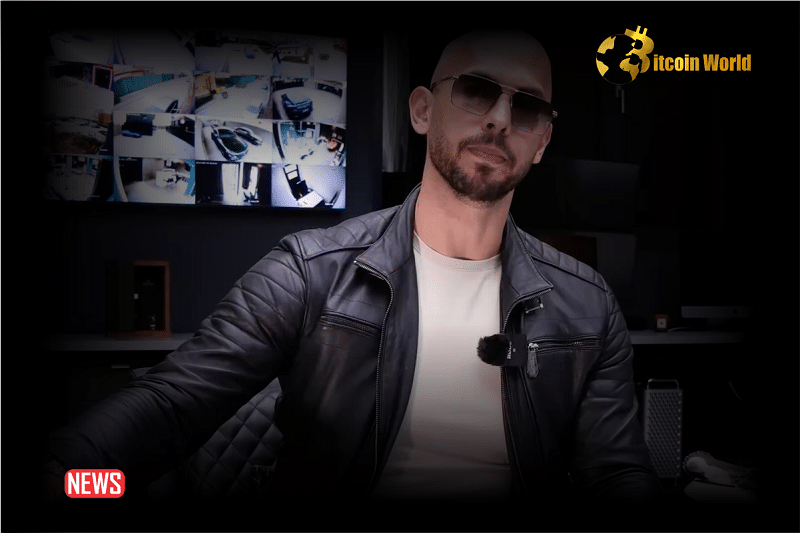Cryptocurrency, while promising innovation, is unfortunately rife with scams. Billions are lost annually to fraudulent schemes, and the allure of quick riches can blind even savvy investors. Enter internet personalities like Andrew Tate. With millions of followers hanging on their every word, their influence in the crypto space can be a double-edged sword. Recently, Tate found himself in the crosshairs of scam accusations. Let’s dive into the controversy and dissect what really happened.
Did Andrew Tate Try to Scam His Followers with Crypto?
- Accusations are swirling that Andrew Tate attempted to scam his massive online following.
- The controversial influencer is accused of subtly promoting a new crypto project.
- However, Tate vehemently denies ever endorsing any crypto or NFT projects for financial gain.
- Adding fuel to the fire, Tate publicly stated that crypto investors are essentially lacking the drive and skills needed for real-world success.
The crypto world is no stranger to fraud. From sophisticated hacks to blatant Ponzi schemes, the industry is battling a constant tide of scams. This persistent threat not only erodes investor confidence but also hinders wider acceptance of cryptocurrencies. In this volatile landscape, the pronouncements of influential figures like Andrew Tate carry significant weight. Their words can sway opinions and, crucially, investment decisions, potentially turning even the most transparent scam into a seemingly viable opportunity.
The latest controversy involving Tate erupted when he tweeted details about a seemingly new crypto project. This quickly triggered accusations that he was attempting to exploit his vast following for personal profit. However, almost as quickly as the tweet appeared, it was retracted. Tate, characteristically defiant, responded to the backlash by claiming he never endorsed any crypto project in the first place.
See Also: Aloha Hawaii Becomes Crypto-friendly, Drops Crypto Licensing Plans, Leaving Industry Unregulated
Tate: Defender of Fans or Crypto Critic?
Despite posting about a new crypto venture that offered early access to students of his “Hustlers University,” Tate maintains a narrative of protection. He asserts that he aims to shield his followers from financial harm and has never promoted crypto or NFTs for his own enrichment.
I refuse to have an Andrew Tate fan, who believes in Andrew Tate lose anything because I already have the dreams and aspirations of all the fucking idiots out there who are gambling, I already have all the money in the world, I'm not going to hurt my own fans. pic.twitter.com/v83oEaZk3o
— Andrew Tate (@Cobratate) February 2, 2024
“I refuse to have an Andrew Tate fan, who believes in Andrew Tate lose anything because I already have the dreams and aspirations of all the f*cking idiots out there who are gambling, I already have all the money in the world, I’m not going to hurt my own fans,” Tate declared, doubling down on his seemingly altruistic stance.
While acknowledging the release of an NFT collection, Tate clarified that these NFTs were not sold for profit. Instead, they were given away freely as bonuses with merchandise purchases. He further pointed out that some collectors subsequently profited in the NFT secondary market, implying this was separate from his intentions.
According to Tate, pinning hopes on crypto or NFTs for wealth is a sign of “lazy losers” – individuals seeking effortless riches without committing to personal growth and hard work. He champions the traditional virtues of skill development, discipline, and diligent effort as the true path to success, contrasting it sharply with what he sees as speculative digital gambling.
Crypto Investors: “Brokies” in Tate’s World?
Expanding on his critique of speculative digital assets, Tate argues that the lure of easy crypto money can actually be detrimental. He suggests it can erode the motivation needed to achieve success through traditional hard work and determination.
Tate posits that experiencing quick gains in crypto can create a mindset fixated on repeated gambling wins, rather than fostering a work ethic.
“You’re not going to wake up and say I’m going to be a hard worker, money is hard to make, I’m going to be disciplined, I’m going to be motivated. You’re not one of them, you just want to win another gamble,” Tate asserted, reinforcing his dismissive view of crypto investors.
In a further display of his anti-crypto sentiment, the controversial figure portrayed himself as a wealthy individual positioned to profit from the desperation of “brokies” chasing speculative investments, leveraging his own wealth and connections.
Tate also took aim at NFT enthusiasts, mocking them for spending fortunes on “JPEGs,” which he derided as easily copied, lacking real-world value, and ultimately inconsequential.
See Also: Bitcoin Is An Opportunity You Shouldn’t Miss: Andrew Tate To Crypto Investors
Despite these strong pronouncements, Tate later dismissed the crypto project proposal as a joke, not intended to be taken seriously.
True to his characteristic style, Tate responded to the outcry with mockery and a flaunting of his wealth. This incident throws into sharp relief the ambiguous and often blurred lines between online personality, marketer, and potential exploiter, especially within the rapidly evolving and often unregulated crypto industry.
#Binance #WRITE2EARN
Disclaimer: The information provided is not trading advice, Bitcoinworld.co.in holds no liability for any investments made based on the information provided on this page. We strongly recommend independent research and/or consultation with a qualified professional before making any investment decisions.




